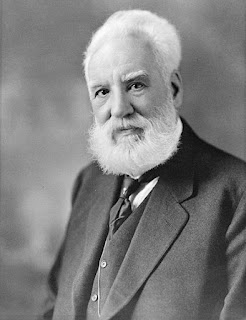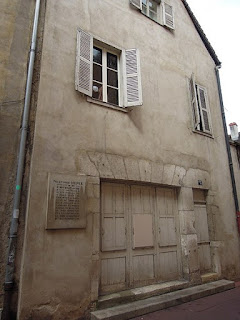History of Alexander Graham Bell
Alexander Graham Bell (/ˈɡreɪ.əm/, born Alexander Bell; March 3, 1847 – August 2, 1922) was a Scottish-born inventor, scientist and engineer who is credited with patenting the first practical telephone. He also co-founded the American Telephone and Telegraph Company (AT&T) in 1885.Bell's father, grandfather, and brother had all been associated with work on elocution and speech, and both his mother and wife were deaf; profoundly influencing Bell's life's work. His research on hearing and speech further led him to experiment with hearing devices which eventually culminated in Bell being awarded the first U.S. patent for the telephone, on March 7, 1876. Bell considered his invention an intrusion on his real work as a scientist and refused to have a telephone in his study.
Many other inventions marked Bell's later life, including groundbreaking work in optical telecommunications, hydrofoils, and aeronautics. Bell also had a strong influence on the National Geographic Society and its magazine while serving as the second president from January 7, 1898, until 1903.
Beyond his work in engineering, Bell had a deep interest in the emerging science of heredity.Bell was born in Edinburgh, Scotland, on March 3, 1847. The family home was at South Charlotte Street, and has a stone inscription marking it as Bell's birthplace. He had two brothers: Melville James Bell (1845–1870) and Edward Charles Bell (1848–1867), both of whom would die of tuberculosis. His father was Alexander Melville Bell, a phonetician, and his mother was Eliza Grace Bell (née Symonds). Born as just "Alexander Bell", at age 10, he made a plea to his father to have a middle name like his two brothers.
For his 11th birthday, his father acquiesced and allowed him to adopt the name "Graham", chosen out of respect for Alexander Graham, a Canadian being treated by his father who had become a family friend. To close relatives and friends he remained "Aleck". Bell and his siblings attended a Presbyterian Church in their youth.As a child, Bell displayed a curiosity about his world; he gathered botanical specimens and ran experiments at an early age. His best friend was Ben Herdman, a neighbour whose family operated a flour mill. At the age of 12, Bell built a homemade device that combined rotating paddles with sets of nail brushes, creating a simple dehusking machine that was put into operation at the mill and used steadily for a number of years. In return, Ben's father John Herdman gave both boys the run of a small workshop in which to "invent".
From his early years, Bell showed a sensitive nature and a talent for art, poetry, and music that was encouraged by his mother. With no formal training, he mastered the piano and became the family's pianist. Despite being normally quiet and introspective, he revelled in mimicry and "voice tricks" akin to ventriloquism that continually entertained family guests during their occasional visits. Bell was also deeply affected by his mother's gradual deafness (she began to lose her hearing when he was 12), and learned a manual finger language so he could sit at her side and tap out silently the conversations swirling around the family parlour. He also developed a technique of speaking in clear, modulated tones directly into his mother's forehead wherein she would hear him with reasonable clarity. Bell's preoccupation with his mother's deafness led him to study acoustics.
His family was long associated with the teaching of elocution: his grandfather, Alexander Bell, in London, his uncle in Dublin, and his father, in Edinburgh, were all elocutionists. His father published a variety of works on the subject, several of which are still well known, especially his The Standard Elocutionist (1860),
which appeared in Edinburgh in 1868. The Standard Elocutionist appeared in 168 British editions and sold over a quarter of a million copies in the United States alone. In this treatise, his father explains his methods of how to instruct deaf-mutes (as they were then known) to articulate words and read other people's lip movements to decipher meaning. Bell's father taught him and his brothers not only to write Visible Speech but to identify any symbol and its accompanying sound. pronunciation Bell became so proficient that he became a part of his father's public demonstrations and astounded audiences with his abilities. He could decipher Visible Speech representing virtually every language, including Latin, Scottish Gaelic, and even Sanskrit, accurately reciting written tracts without any prior knowledge of their pronunciation.
Thanks for reading....




Comments
Post a Comment